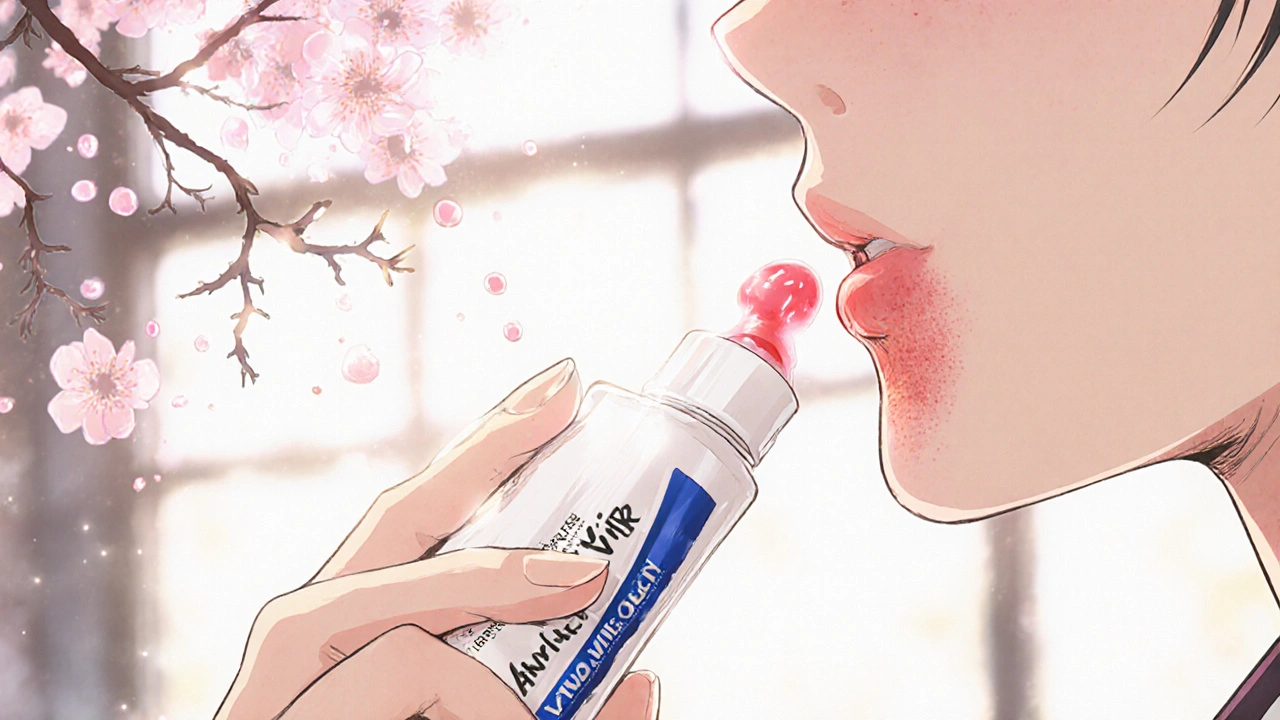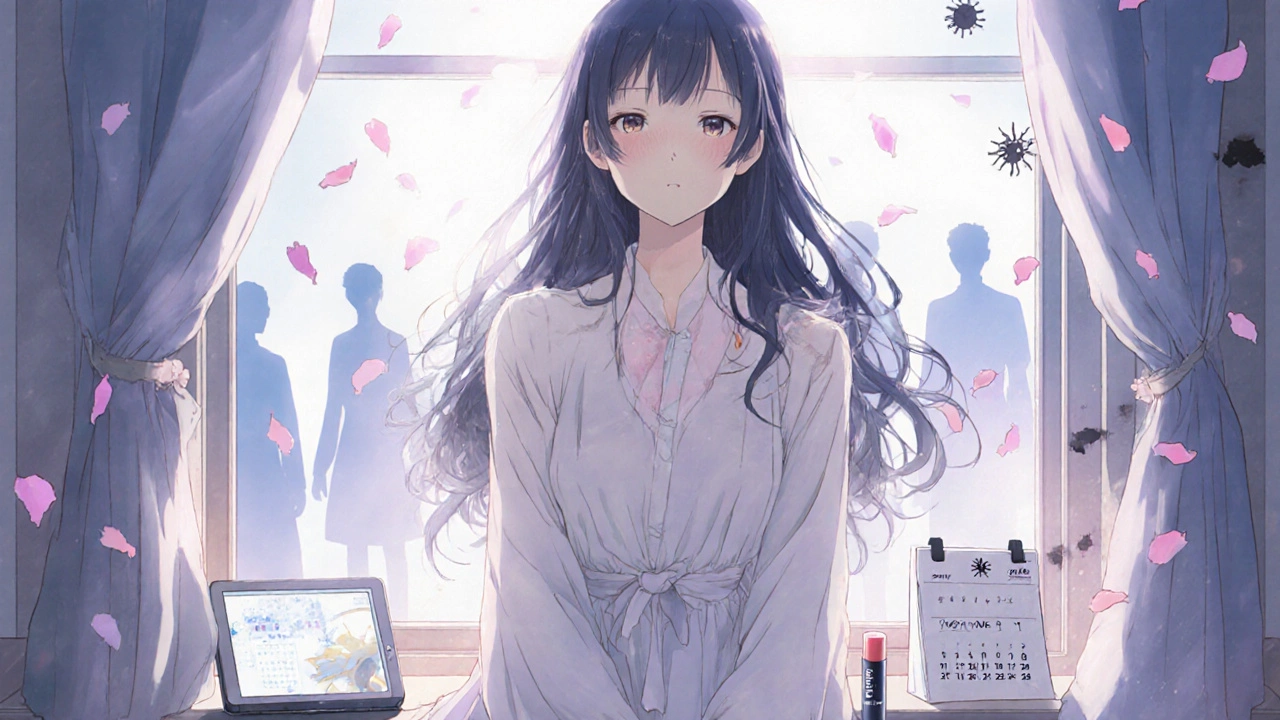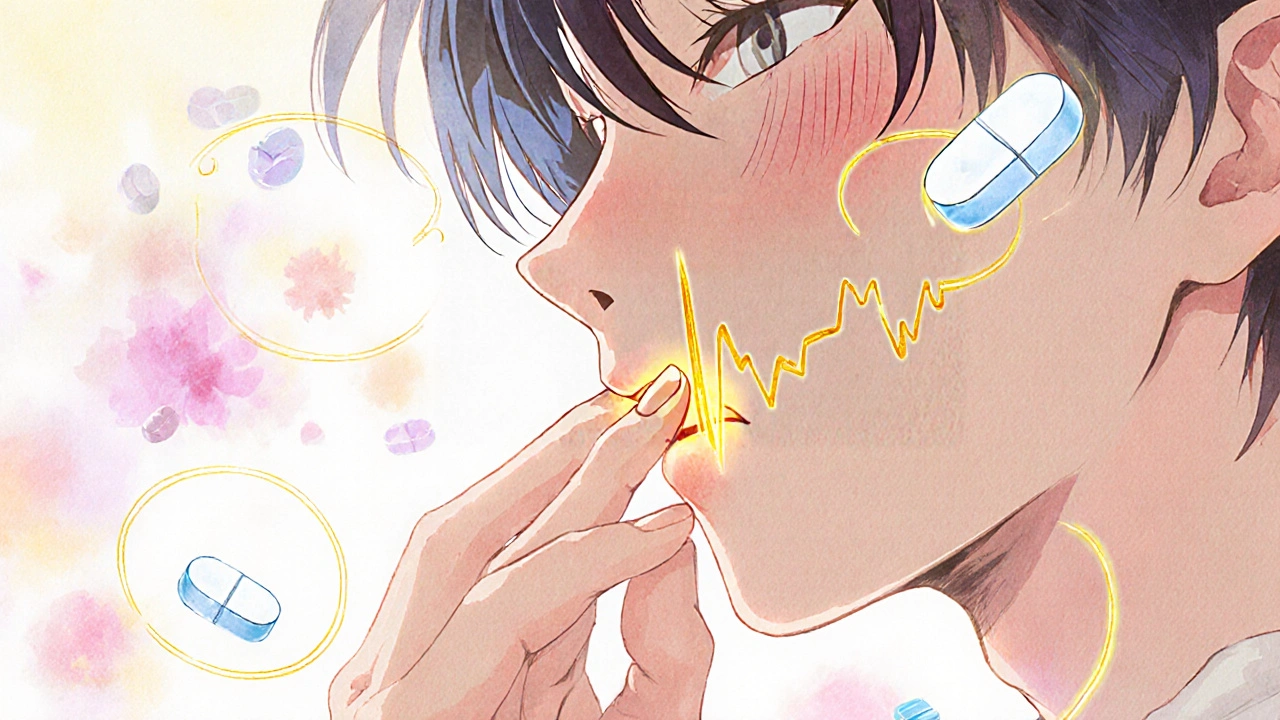When a cold sore pops up, it’s not just annoying-it’s painful, embarrassing, and often comes at the worst time. You might feel a tingling on your lip days before the blister appears. By the time you see the red bump, you’re already dealing with burning, swelling, and maybe even a fever. Over-the-counter creams help a little, but if you want real relief and faster healing, acyclovir is one of the most proven options out there.
What is acyclovir, and how does it work on cold sores?
Acyclovir is an antiviral medication that targets the herpes simplex virus (HSV-1), the main cause of cold sores, also called herpes labialis. It doesn’t kill the virus outright-your body keeps the virus dormant in nerve cells for life. But when the virus wakes up and starts replicating, acyclovir steps in to block its ability to make copies of itself.
This stops the infection from spreading deeper into the skin and reduces how long the outbreak lasts. Studies show that starting acyclovir within 24 hours of the first tingling sensation can shorten healing time by about 1 to 2 days. It also lowers the risk of the sore becoming larger or more painful.
Acyclovir comes in several forms: oral tablets, topical cream, and intravenous (IV) for severe cases. For cold sores, most people use the pill or the cream. The tablet works systemically-it travels through your bloodstream to where the virus is active. The cream only affects the surface of the skin, so it’s less effective unless used very early.
When should you start taking acyclovir for the best results?
Timing is everything. The moment you feel that telltale itch, sting, or tightness on your lip-don’t wait for the blister to form. That’s your signal to act. Waiting until you see the fluid-filled bump means the virus has already multiplied significantly. At that point, the medication still helps, but not as much.
For oral acyclovir, the standard dose for cold sores is 200 milligrams taken five times a day for five days. Some doctors recommend a higher dose-400 mg three times a day-for faster results. A single-day treatment with 2,000 mg taken twice, 12 hours apart, is also FDA-approved and just as effective for many people.
Topical cream (5% acyclovir) should be applied five times daily for four days. But here’s the catch: the cream only reduces symptoms slightly better than a placebo. It doesn’t speed up healing nearly as much as the pill. If you’re choosing between the two, the tablet wins.
How much pain relief can you expect?
People who take acyclovir early report less burning and tenderness. In clinical trials, patients using oral acyclovir said their pain dropped by 30-50% within 48 hours, compared to those who didn’t take it. The blisters also crust over faster, reducing the risk of cracking, bleeding, or spreading the virus to others.
One study from the University of Washington tracked 120 adults with recurring cold sores. Those who started acyclovir at the first sign of tingling had their sores fully healed in an average of 4.5 days. The placebo group took 7.1 days. That’s a 36% reduction in healing time-and less time being uncomfortable.
Acyclovir doesn’t numb the pain like lidocaine creams do, but by stopping the virus from spreading, it removes the source of the pain. Many users say the discomfort feels more like a mild sunburn than the sharp, throbbing pain they used to get.

What about side effects? Is acyclovir safe?
For most healthy adults, acyclovir is very safe. The most common side effects are mild: nausea, headache, or dizziness. These usually go away on their own. Taking it with food helps reduce stomach upset.
Severe reactions are rare. If you get a rash, swelling, trouble breathing, or confusion, stop taking it and call a doctor. People with kidney problems need a lower dose because acyclovir is cleared by the kidneys. If you’re on dialysis or have chronic kidney disease, talk to your doctor before starting.
Acyclovir is safe during pregnancy and breastfeeding. The American College of Obstetricians and Gynecologists lists it as a preferred antiviral for herpes outbreaks in pregnant women. It’s also approved for use in children over two years old.
How does acyclovir compare to other cold sore treatments?
There are other antiviral options like valacyclovir and famciclovir. These are actually prodrugs of acyclovir-they convert into acyclovir in your body. But they’re designed to be absorbed better, so you take them fewer times a day.
Valacyclovir (Valtrex) is the most popular alternative. You take 2,000 mg twice a day for one day. It’s more expensive than generic acyclovir, but many people prefer it because it’s simpler. Famciclovir (Famvir) requires two doses of 1,500 mg within 12 hours. Both work just as well as acyclovir if taken early.
Over-the-counter products like Abreva (docosanol) claim to shorten healing time, but the data is weak. In trials, it only reduced healing by about half a day. It’s not a bad option if you can’t get a prescription, but it’s not as strong.
Home remedies-tea tree oil, lemon balm, ice packs-might soothe the area, but they don’t stop the virus. They’re comfort measures, not treatments.
Can you prevent cold sores from coming back?
Acyclovir can help with prevention, too. If you get cold sores more than six times a year, your doctor might prescribe a daily low dose-like 400 mg twice a day-to suppress outbreaks. This is called chronic suppression. It doesn’t cure herpes, but it can cut the number of outbreaks in half.
Triggers like stress, sun exposure, illness, or hormonal changes can bring back cold sores. Wearing lip balm with SPF 30+ helps if sunlight is your trigger. Managing stress through sleep, exercise, or breathing techniques can also reduce flare-ups.
One study in Seattle found that people who used sunscreen on their lips daily had 40% fewer outbreaks over a year. Simple habits matter.

What to do if acyclovir doesn’t work
If you’ve taken acyclovir correctly and your cold sore still lasts longer than 10 days, it might not be a herpes outbreak. Other conditions like angular cheilitis, canker sores, or bacterial infections can look similar. See a doctor if:
- The sore doesn’t improve after 10 days
- You develop a high fever or swollen lymph nodes
- The blister spreads to your eyes or inside your mouth
- You have a weakened immune system from cancer, HIV, or steroids
In rare cases, the virus becomes resistant to acyclovir. That’s more common in people with HIV or organ transplants. If resistance is suspected, your doctor may switch you to foscarnet or cidofovir.
Real-world tips for using acyclovir effectively
Here’s what works based on real patient experiences:
- Keep a prescription on hand. Don’t wait until you’re in pain to call your doctor.
- Set phone reminders to take your pills on time. Missing a dose reduces effectiveness.
- Don’t touch the sore. Wash your hands before and after applying cream or touching your face.
- Avoid kissing, sharing utensils, or lip balm during an outbreak.
- Use a clean towel and wash bedding frequently to avoid reinfecting yourself.
Many people keep a small bottle of acyclovir in their medicine cabinet, purse, or desk drawer. When they feel that first tingle, they take it immediately. No waiting. No second-guessing. That’s the key.
Can acyclovir cure herpes labialis permanently?
No. Acyclovir doesn’t eliminate the herpes virus from your body. Once you’re infected, the virus stays dormant in nerve cells. Acyclovir only stops it from multiplying during an outbreak. It reduces symptoms and healing time but doesn’t prevent future outbreaks unless taken daily as a suppressive therapy.
Is it safe to take acyclovir every day to prevent cold sores?
Yes, for people who have frequent outbreaks (six or more per year), daily low-dose acyclovir is a safe and effective way to reduce recurrence. Studies show it cuts outbreaks by 50-75%. Side effects are rare at low doses. Talk to your doctor to see if this is right for you.
Can children use acyclovir for cold sores?
Yes. Acyclovir is approved for children over two years old. Dosing is based on weight. For a child with a cold sore, a doctor will typically prescribe 200 mg five times a day for five days, adjusted for size. Always follow medical advice-don’t use adult doses for kids.
Does acyclovir work on genital herpes too?
Yes. Acyclovir is effective against both HSV-1 (oral herpes) and HSV-2 (genital herpes). The dosing is different for genital outbreaks-usually higher and longer. But the mechanism is the same: stop the virus from replicating. It’s one of the most widely used treatments for both types.
How soon can I kiss someone after using acyclovir?
Wait until the sore is completely gone-no scab, no redness, no tingling. Even after the blister heals, the virus can still shed and spread. Acyclovir reduces shedding, but doesn’t eliminate it. To be safe, avoid kissing for at least 3-5 days after the scab falls off.
Can I buy acyclovir over the counter?
In the United States, acyclovir tablets and cream require a prescription. Some online pharmacies offer telehealth consultations where you can get a prescription quickly. The cream is available OTC in some countries, but not in the U.S. Don’t trust websites selling it without a prescription-they may be selling counterfeit or expired drugs.
Final thoughts: Take action early
Cold sores are common, but they don’t have to control your life. Acyclovir isn’t magic, but it’s one of the few treatments with solid science behind it. The difference between waiting and acting fast is the difference between a week of discomfort and a few days of mild irritation.
If you get cold sores often, talk to your doctor about keeping acyclovir on hand. Learn your triggers. Use sunscreen. Manage stress. And when you feel that first sting-take the pill. It’s the simplest, most effective step you can take to get back to normal faster.


George Clark-Roden
November 1, 2025 AT 01:56That first tingle? I swear, it’s like my lip knows before I do. I keep acyclovir in my wallet-yes, my actual wallet-because I’ve learned the hard way that waiting even an hour means three extra days of misery. It’s not magic, but it’s the closest thing we’ve got. I used to think it was just stress, then I realized it’s always after sunburn or a bad night’s sleep. The science here? Spot on. I don’t need a PhD to know that stopping the virus before it throws a party is smarter than cleaning up the mess later.
Hope NewYork
November 2, 2025 AT 19:41Acyclovir? Lol. You think the virus doesn’t know you’re taking it? They’ve been evolving since the Stone Age. Big Pharma just wants you hooked on pills so you keep buying more. I used lemon balm and ice and my cold sore vanished in 2 days. Also, why do you think it’s always on your lip? Maybe it’s your phone. Or your pillow. Or your ex. Just saying.
Bonnie Sanders Bartlett
November 4, 2025 AT 14:13I’ve had cold sores since I was 12. My mom always said to catch it early. She was right. I started taking acyclovir at the first sign and it changed everything. No more hiding behind my hand when I laugh. No more avoiding hugs. I keep it in my purse now. I even told my sister and she started doing it too. Small things like this make life easier. You don’t need to suffer.
Melissa Delong
November 5, 2025 AT 01:11Have you considered that the herpes virus is not the real problem? The real issue is the medical-industrial complex that profits from fear. Acyclovir is a patented compound that requires a prescription, which means you’re being controlled. Why not try colloidal silver? Or alkaline diets? Or simply stop touching your face? The FDA approves drugs based on corporate lobbying, not science. I’ve had cold sores for 20 years and never took a pill. I’m still here. That’s proof enough.
Marshall Washick
November 6, 2025 AT 02:04Just wanted to say-this is the most practical, no-fluff guide I’ve read. I used to ignore the tingling, thinking it’d go away. It never did. Started taking the 2000mg double dose after reading this. Took me 3 days instead of 8. I didn’t even need to cancel plans. I don’t usually comment on stuff like this… but I’m glad I did. Thanks.